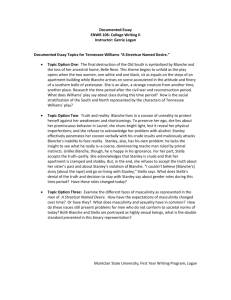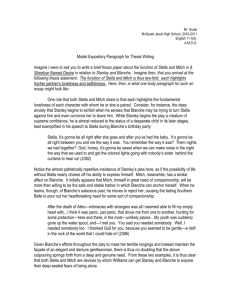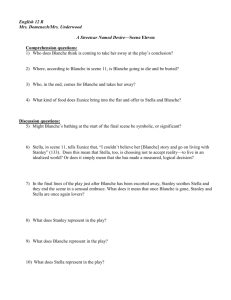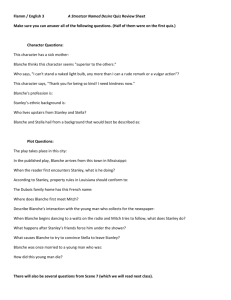Calli Fox`s “Stella`s Lost Identity in A Streetcar Named Desire“
advertisement
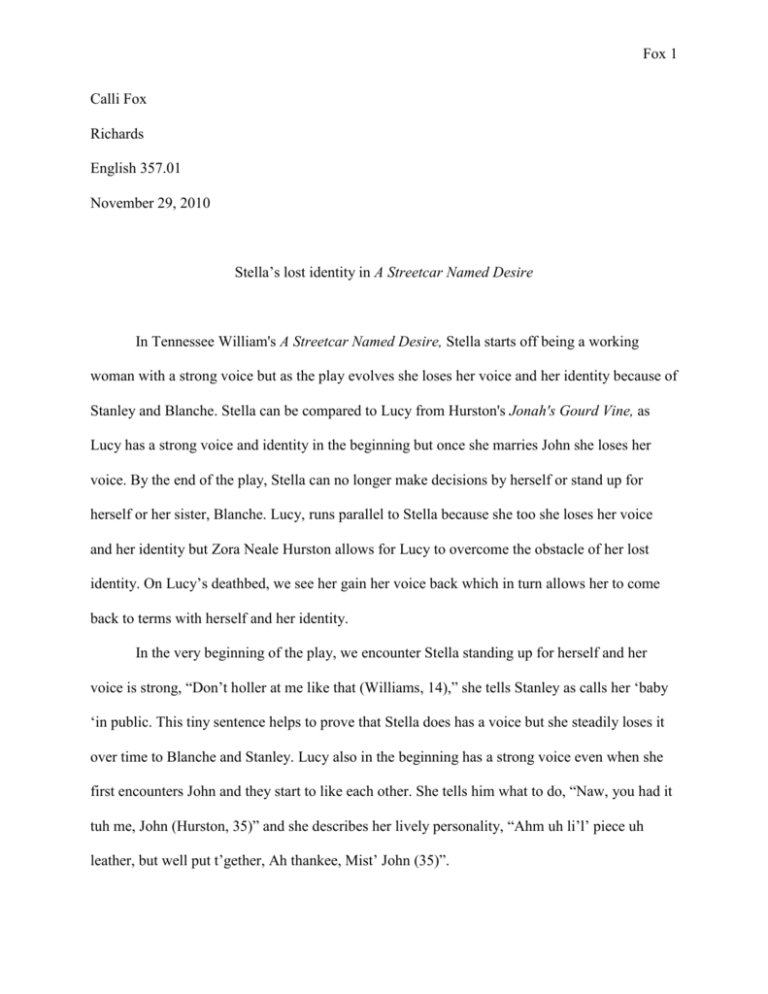
Fox 1 Calli Fox Richards English 357.01 November 29, 2010 Stella’s lost identity in A Streetcar Named Desire In Tennessee William's A Streetcar Named Desire, Stella starts off being a working woman with a strong voice but as the play evolves she loses her voice and her identity because of Stanley and Blanche. Stella can be compared to Lucy from Hurston's Jonah's Gourd Vine, as Lucy has a strong voice and identity in the beginning but once she marries John she loses her voice. By the end of the play, Stella can no longer make decisions by herself or stand up for herself or her sister, Blanche. Lucy, runs parallel to Stella because she too she loses her voice and her identity but Zora Neale Hurston allows for Lucy to overcome the obstacle of her lost identity. On Lucy’s deathbed, we see her gain her voice back which in turn allows her to come back to terms with herself and her identity. In the very beginning of the play, we encounter Stella standing up for herself and her voice is strong, “Don’t holler at me like that (Williams, 14),” she tells Stanley as calls her ‘baby ‘in public. This tiny sentence helps to prove that Stella does has a voice but she steadily loses it over time to Blanche and Stanley. Lucy also in the beginning has a strong voice even when she first encounters John and they start to like each other. She tells him what to do, “Naw, you had it tuh me, John (Hurston, 35)” and she describes her lively personality, “Ahm uh li’l’ piece uh leather, but well put t’gether, Ah thankee, Mist’ John (35)”. Fox 2 Stella and Lucy prove that the loss of their voices occur over time, starting even in the beginning. Stella explains to Blanche when she first arrives that, “You never did give me a chance to say much, Blanche. So I just got in the habit of being quiet around you (Williams, 20)” and Lucy, after her encounter with John at the bridge, goes home and cries about not being able to grow, “Ah ain’t growed none hardly. Ah ain’t never gointer get grown (Hurston, 36)”. This portrayl of Lucy and her body represents her identity and voice slipping away. If she isn’t tall enough for herself then she isn’t good enough for John Pearson. Stella’s voice waivers while her and Blanche talk about Belle Reve and she tries to stay strong, “Blanche! You be still! That’s enough (27)”. Blanche is thrown a little off guard by her Stella’s crying and forcefulness. In this scene, we get the image of Stella being an independent woman who leaves her family’s plantation for something better in the world. Stella’s identity is strongest here as we get a feel for her strength in her personality and in her voice as Blanche tells us how Stella left and Blanche had to fend for herself. Hurston has a parallel scene to this with Lucy. She tells John in a letter she is whipped from talking to him but he is her “dolling sugar lump” and she is his sweet heart. Lucy shows that she doesn’t care what her Mother says and she is going to do what she wants signaling her independence. Stella doesn’t lose her voice through one person but through Blanche and Stanley unlike Lucy who only loses it through John. Once Blanche comes to visit, it is a downward hill for Stella and her identity. She turns into a background character and we come to focus more on Blanche and Stanley. Griffies W Scott states in his essay A Streetcar Named Desire and Tennessee Williams’ object-relational conflict, that “they [Blanche and Stanley] are attracted to each other with the sticky attractions of abused to abuser, and vice versa (Scott 113)”. This attraction helps lead to Stella becoming less of a relation to them and more of just an object. Fox 3 Stella is ignored as Blanche and Stanley get to know each other, from the beginning they met where Stanley takes his shirt off to the rape scene. In scene two, we can see Blanche taking away Stella’s voice as she comes out of the bathroom and says to Stanley, “Hello, Stanley! Here I am, all freshly bathed and scented, and feeling like a brand new human being!(37).” This quote here shows that Blanche is offering her body to Stanley, taking Stella out of the picture, literally and figuratively. Later in the same scene, Stella’s requests are ignored when she tells first Stanley to come outside and then Blanche and they respond that they are having a discussion. Stella’s voice is lost here and never regained back. Stanley’s obession with girls, noted in a side note on page 29, “He sizes women up at a glance, with sexual classificaitons, crude images flashing into his mind and determining the way he smiles at them”, is what drives Stella to lose her voice. Scott claims that “Stanley is to wreak havoc on the innocent and vulnerable (118)”, which proves that Stanley’s purpose is to weaken Stella who is innocent. John and Lucy’s story can be compared to Stella and Stanley because Lucy loses her voice through John’s repeated sexual relations with other women. John is also one who is wreaking havoc on the innocent, which is Lucy. She still has her voice and identity while she is courting John as her Mother yells out, “..Ah see she done got hard-headed, and Ahm gwine pray fuh her. Hard-headed chillun never come tuh no good end. Mind whut Ah say! Ahm gwine tell God about you, madam (73). She is too hard-headed to listen to her mother but her mother is right when she says they never come to a good end because Lucy loses her womanhood identity while with John. On page 75, we get a foreshadowing of Lucy’s inability to be independent, “ Lucy suddenly lost her fluency of speech. She worked furiously at the love-knot”. When she is married to John, she works hard at raising their family and keeping their marriage together, Fox 4 leaving no time for her identity or voice. Finally, on her deathbed does Lucy regain her voice and tells John what she really thinks of him, “Ah ain’t going’ tuh hush nothin’ uh de kind. Youse livin’ dirty and Ahm goin’ tuh tell you ‘bout it. Me and mah chillun got some rights. Big talk ain’t changin’ whut you doin’. You can’t clean yo’self wid yo’ tongue lak uh cat (128, 129).” Hurston allows for Lucy to be seen in a positive light by allowing her to overcome the obstacle of losing herself unlike Williams who strips Stella’s voice away. She in the end, turns to her husband and trusts him before herself. On page 140, Stella runs out of the room as the doctor’s come to take Blanche away leaving Stanley to deal with her sister. We also see Stella question herself, “ What have I done to my sister? Oh, God, what have I done to my sister? (141)”, proving that Stella no longer sees herself as a person with responsibilities. This end to the novel, ultimately proves that Stanley is making decisions for Stella now and has become her voice of reason. Lee R. Edwards writes in Sexuality, Maternity and Selfhood about Edna losing her voice as well to the marriage of Leonce. In the beginning of The Awakening Leonce complains about Edna getting burnt, which Edwards says is “his [Leonce] objections to what he experiences as a change in Edna and hostility towards himself (Edwards 283)” and her being burnt is meaning “that she is ‘a valuable piece of personal property which has suffered some damage”. In this scene alone, we see that Edna has lost her identity through marriage and is no longer an individual but property. This parallels with Stella and her losing her identity and becoming more of a object or piece of property. But unlike Stella, Edna has lost her voice and identity in the beginning of the novel and gradually claims it back. Edna explains to Robert that she is Fox 5 “no longer one of Mr. Pontellier’s possessions to dispose of or not. I give myself where I choose. If he were to say, “Here, Robert, take her and be happy; she is yours,’ I should laugh at you both (Chopin 102)”. Edna finds her voice although her end is fatal which does parallel to Stella’s. Stella becomes lost in her husband and is unable to think for herself. Stella’s downfall is her sister, Blanche, and her marriage to Stanley. They both team up to take away Stella’s voice as they both ignore her and interact with each other. Even as she stands up for Stanley to Blanche and vice versa, she is losing her identity as she becomes the in between. Her voice is stripped away as Blance and Stanley get to know each other better and push her aside. Stella is never able to reclaim her voice especially when Stanley rapes Blanche, pushing Stella out of the picure. Stella’s voice is lost forever as her sister is taken away and Stanley starts caressing her body. Fox 6 Works Cited Chopin, Kate. The Awakening. New York: W.W. Norton and Company, Inc., 1851. Edwards, Lee R. "Sexuality, Maternity, and Selfhood." Chopin, Kate. The Awakening. New England, 1984. 282-286. Hurston, Zora Neale. Jonah's Gourd Vine. New York: HarperCollins, 1934. Scott, Griffies W. "A Streetcar Named Desire and Tennessee Williams' Object-Relational Conflict." International Journal of Applied Psychoanalytic Studies (2007): 113-120. Williams, Tennessee. A Streetcar Named Desire. New York: Signet, 1947.

